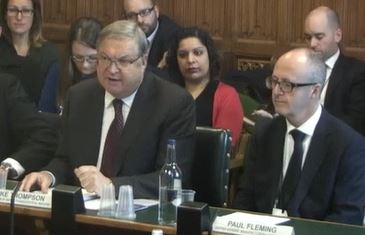Brexit talks collapse again, but sector deal makes pharma upbeat

A dramatic veto from Northern Ireland’s Democratic Unionist Party (DUP) saw Theresa May’s hopes of clinching a ‘divorce settlement’ with the European Union collapse yesterday.
The DUP had opposed a deal which would have seen Northern Ireland remain in ‘regulatory alignment’ with the Republic of Ireland in order to avoid the return of a hard border. This would mean the North would remain in the EU customs union – which would also imply that a new customs border would be necessary between Northern Ireland and the rest of the UK.
The DUP’s leader Arlene Foster had always made her party’s opposition to this arrangement plain, but this seemed to take prime minister Theresa May by surprise, as she was already in Brussels and poised to sign an agreement with the EU when the veto came.
While there is no obvious solution to the border conundrum, the UK government hasn’t given up hope of finding an answer – something it needs to do urgently in order to move onto a trade deal.
The dwindling time left before the Brexit date of March 30, 2019 is causing huge concern in all sectors of business, not least the pharmaceutical industry. It is warning that without a deal on trade and regulation, patients in the UK and the rest of Europe could see major delays and disruptions to their medicine supplies.
Despite these very real concerns, the UK pharmaceutical, biotech and medtech industries will put aside their worries tomorrow when a new ‘Sector Deal’ for the life sciences industries is unveiled by the government.
This puts the sector in a privileged position, as it will be the first industry to be offered a bespoke deal to help it thrive post-Brexit.
Other sectors prioritised in this way will be construction, artificial intelligence (AI), and the automotive industry, which will all get their own agreements.
[caption id="attachment_31180" align="alignnone" width="296"] Sir John Bell[/caption]
Sir John Bell[/caption]
The figurehead for the Sector Deal is Sir John Bell, who drew up a UK Life Sciences Industrial Strategy with industry earlier this year to create a long-term vision for supercharging the sector.
The government’s department for Business, Enterprise, and Industrial Strategy (BEIS) will host a stakeholder reception tonight ahead of tomorrow’s launch, which is expected to include GlaxoSmithKline unveiling a major new UK investment.
The Financial Times has also revealed that a US-based life sciences investment fund is planning to invest up to $1bn to create a large biotech company in the UK.
The identity of the fund remains unknown until tomorrow, but will help BEIS minister Greg Clark argue that the UK is still attracting major investment despite Brexit.
Speaking to a BEIS House of Commons committee investigating the impact of Brexit on the sector so far, Mike Thompson, head of UK pharma association the ABPI, said he was very pleased with the government’s collaboration on the strategy.
He also hailed last week’s decision by Merck Sharp & Dohme to expand its drug discovery investment in the UK, saying it reflected the country’s status as the third best place to do this work, after the East and West coasts of the US.
However he conceded that Brexit was already added cost and uncertainty to UK pharma, with GSK already deciding to invest million in new medicine supply chain facilities in the EU27 to ensure it doesn’t get caught out by Brexit.
Tomorrow’s sector deal is likely to contain some substantial incentives from the UK government, and genuine endorsement from the sector.
However the Sector Deal will certainly have its limits, and will not bring any new deal on medicines pricing and market access, the UK sector’s longest running complaint.
Nor can the UK government guarantee that the UK life science sector will be able to maintain regulatory alignment with the European Medicines Agency, or guarantee ‘frictionless trade’, as Brexit negotiations remain mired on the ‘divorce proceedings’ stage.
Thompson said the UK would “inevitably be diminished” if it could not align with the EU (or the US).
[caption id="attachment_34766" align="alignnone" width="395"] The ABPI's Mike Thompson (left) gave evidence this morning to a Commons committee on Brexit[/caption]
The ABPI's Mike Thompson (left) gave evidence this morning to a Commons committee on Brexit[/caption]
Asked by the committee of MPs if the pharma industry had identified any out-and-out opportunities of Brexit, he replied:
“What is the upside? I have to tell you, we didn’t come up with very much.” He said.
Thompson added that the only option for the UK life sciences sector if it fails to strike an alignment agreement would be to focus on “speed and agility,” but indicated this would be a poor second to staying in tune with the rest of Europe.
The issue of freedom of movement and access to the best global talent was also raised, and will be another issue that can only be fully settled at the negotiating table with the EU.
The sector will be hoping it can “have its cake and eat it” in terms of securing a mutually-beneficial deal with Europe and a strong UK sector deal – but the built-in contractions of the UK government’s Brexit position remain a major obstacle to that.













